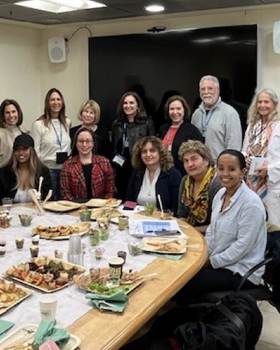A Chaplain’s Perspective: Abraham Charts a Way for Us
By Rabbi Cheryl Weiner, Director of The Sacred Jewish Conversation Project
In the Torah portion Chayei Sarah, we consider our first patriarch Abraham’s burial site for his wife and his family. We also examine how Abraham wants to live out his legacy by making sure that his son, Isaac, has an appropriate wife from his kinship line. Then, Abraham marries Keturah, some say a pseudonym for Hagar, rounding out his last stage of life “his way.” Finally, we witness the reconciliation of his two sons, Isaac and Ishmael, who come to bury Abraham together. What a narrative about end-of-life and legacy creation!
As a hospice chaplain, I work with end-of-life issues as part of my calling. How I wish that this parshah was the way that my clients could live out their legacy, deal with family challenges and fulfill their end-of-life wishes!
As part of the Sacred Jewish Conversation, we encourage people to have The Conversation that expresses how they want to experience the end stage of their lives. We encourage people to take care of any family issues that remain, to engage in the teshuvah (repentance) that they need to make, to take care of their material estate as well as their spiritual estate. We work with people to create ethical wills and statements of personal values. We encourage people to discuss their “bucket list” with their loved ones so that people know what needs to be taken care of and how they can help. Significantly, we try to help people discuss what medical care and end-of-life decisions they might want carried out as part of their dying process if they can no longer express their desires.
We often avoid talking about our end-of-life desires, telling ourselves that we do not want loved ones to worry or to concern themselves with our needs. However, the most important time to have these conversations is when we are healthy and have the capacity to fully engage in this critical conversation.
Thus, I am including some of the questions that you might want to consider and share with your loved ones.
• When you think about the last stage of your life, what’s most important to you? Describe what you want to help maintain your quality of life.
• Do you have an end-of-life plan that makes it clear to everyone where you want to spend your declining years and how you wish to die? Do you wish to be at home, in a hospital or under hospice care?
• To what extent will Jewish law dictate your wishes and do you have clergy who know your wishes?
• What affairs do you need to get in order (personal finances, property issues, funeral arrangements, closure on relationships, etc.)?
• Have you communicated what you decided in terms of these affairs?
• Do you have a will or estate plan that clarifies your wishes to avoid future moments of crisis, stress and family conflicts over your material legacy?
• Have you created an ethical will? Do you have a statement that shares who you are, what you believe in and describes your vision of life? What made your life worth living? What are the values — both Jewish and universal — that have guided you and that you wish to pass on?
• Do you have an end-of-life spiritual legacy plan — a way of engaging with your loved ones that manifests your values? Do you want to share a vacation or set up family visits? Do you want to create a family trust or a tzedakah plan? Do you want to volunteer together in a tikkun olam/restorative justice project?
Through Abraham’s life, we learn what our tradition considers important in terms of some of the end of life planning and reconciliation processes of our ancestors. However, we don’t know the spiritual issues with which they wrestled. We have to determine those inner dimensions ourselves. Reflecting on their journeys, we have to deal with the material nature of our end-of-life issues and to wrestle with the spiritual ones in our own lives and those of our loved ones.









